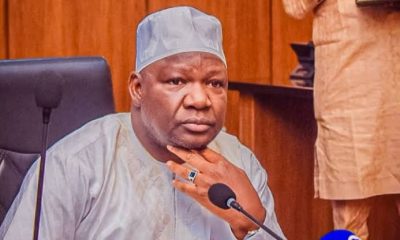Economy
CBN says staggering $26bn illicitly passed through Binance Nigeria in one year

Mr. Yemi Cardoso, the Central Bank of Nigeria (CBN) governor, said on Tuesday that over $26 billion in illicit flows had passed through the crypto platform Binance in the last year.
Cardoso said this on Tuesday after the MPC meeting in Abuja.
“We are concerned that certain practices go on that indicate illicit flows, going through a number of these entities and suspicious flows.
“In the case of Binance, in the last year, $26 billion has passed through Binance Nigeria from sources and users who we cannot adequately identify,” he told reporters in his first MPC meeting since assuming office as the CBN governor.
The CBN also raised the country’s Monetary Policy Rate (MPR) by four hundred basis points to 22.75 percent from 18.75 percent.
The MPR has been 18.75 percent since the last MPC meeting between 24th and 25th July 2023.
With inflation at 29.90 percent, he said the new MPR is part of moves to tackle the country’s inflation.
Cardoso who chairs the MPC also said the Cash Reserve Ratio(CRR) has been raised to forty-five percent while the liquidity ratio was left unchanged at thirty percent.
Nigeria has been battling economic woes in recent months, but Cardoso said his team is not responsible for that.
“I laugh at that question but it’s not a laughing matter and I think it is very important for Nigerians to understand that the Central Bank Governor — I and my team — are not responsible for the woes that we have today; we are part of the solution,” the former Lagos State Commissioner for Economic Planning and Budget said.
“We are determined to ensure that we work hard to get out of the mess that Nigeria is in. We assumed responsibility in a time of crisis of confidence; there was a crisis of confidence and you may all want to go to bed and wish that crisis of confidence was not there but it was, and we can’t turn back the clock.
“All we can do is do the difficult things to make a bad situation better and I do believe that the efforts that we are making are beginning to bring back confidence because to be frank, without confidence in your business, you are not going to get far.”
Economy
OPay Scam Alerts advises Nigerians to remain vigilant against dubious activities

You are just seconds away from sending money – the offer sounds perfect, the seller seems trustworthy and the clock is ticking.
But just before you hit send, one of Nigeria’s leading financial institutions, OPay flashes a critical warning: “Caution – this account has been linked to suspicious activity.”
In that moment, the rush fades, your instincts kick in, and you realise you were on the brink of falling for a scam. One smart alert, one timely pause — and your hard-earned money stays exactly where it should: safe.
This is the power behind OPay’s multi-layered scam alert system — an Artificial Intelligence (AI)-driven, real-time defense network designed to detect and stop fraudulent transactions before they happen.
At the heart of it is a machine learning engine trained on thousands of scam patterns, user reports, flagged accounts, and unusual transaction behaviors. But OPay’s approach goes far beyond a single alert.
How OPay’s scam alert ecosystem works
Abnormal Transaction Pop-Up Reminders
When suspicious behavior is detected, OPay immediately interrupts the flow with a clear, targeted pop-up message. Every day, over 60,000 users receive these urgent fraud warnings — and thanks to that, 30,000 risky transactions are stopped in their tracks.
Intelligent Outbound Call Reminders
For higher-risk transactions, OPay activates a multi-channel response, sending warnings via SMS, email, app notifications, and even escalating to customer service calls. This proactive layer reaches more than 10,000 users daily, discouraging over 8,000 fraudulent transactions.
Interactive Q&A Verification
In cases where more context is needed, users are engaged with real-time Question & Answer (Q&A) prompts to understand the purpose of their transaction. If red flags are confirmed, the system presents a tailored warning or ends the transaction flow altogether. This feature alone helps deter over 46,000 scam attempts daily from the 50,000+ users who interact with it.
Together, these layers form a real-time scam detection and prevention engine that evolves with every user interaction. OPay’s system doesn’t just warn — it learns and adapts, constantly improving its accuracy and response time.
Many users don’t even know they’re in danger until OPay steps in. As one X user, @JAHS, shared: “OPay alerted me that I might be sending money to a scammer when I wanted to patronize an IG vendor. Stopped the transaction ASAP.”
These interventions are happening silently, daily – often before the user even suspects something is wrong.
OPay’s scam alert system is part of a broader philosophy: security is not just about technology – it’s about trust. From scam alerts to Face ID transaction verification, USSD instant account locking, the Large Transaction Shield, and automated callback alerts, every tool is designed to protect users in the moments they can’t predict.
As scams get more sophisticated, the future of financial safety depends on real-time prevention. And OPay isn’t waiting for fraud to happen — it’s stopping it in its tracks. Sometimes, the smartest financial decision you make… is the one OPay helped you avoid.
Economy
States face allocation cuts as agency demands N100bn monthly

The monthly statutory allocations to state governments from the federation account may decline in the coming months following an official request by the Nigeria Sovereign Investment Authority to boost the nation’s residual funds with the support of N100bn monthly.
The request, which was presented by the Managing Director and Chief Executive Officer of NSIA, Aminu Umar-Sadiq, is aimed at unlocking large-scale investments to drive Nigeria’s economic growth.
He made the request at the March revenue-sharing meeting of the Federation Account Allocation Committee held between April 14 and 15, 2025. Our correspondent obtained a copy of his presentation during the meeting on Friday.
Umar-Sadiq appealed to the committee, which includes state commissioners of finance, to consider and approve the request, with funding proposed to commence from the March FAAC allocation.
The presentation was titled, “Activating Residual Funding for the Nigeria Sovereign Investment Authority – Unlocking Opportunities for Large-Scale Investments to Drive Nigeria’s Economic Growth.”
According to the document, the NSIA is requesting a structured monthly disbursement of N100bn from Residual Funds—revenues in the Federation Account beyond projected hydrocarbon income—to establish a Naira-based investible capital pool.
The move, the authority says, will enhance its capacity to finance critical domestic infrastructure projects.
The MD said, “The funding would position the authority as a leading sovereign wealth fund globally, promoting responsible and strategic investments for Nigeria’s economic development and enhancing its threefold mandate to build a savings base for the country, enhance the development of infrastructure, and provide stabilisation support.”
He explained that residual funds are a legitimate source of funds transferred to the authority, provided that the derivation portion of the revenue allocation formula shall not be included as part of this funding.
Economy
More Nigerians to experience poverty by 2027 – World Bank

The World Bank’s latest Africa’s Pulse report has projects a grim future for Nigeria, with poverty expected to rise by 3.6 percentage points by 2027.
Released during the IMF and World Bank Spring Meetings in Washington, DC, the report cites Nigeria’s reliance on oil, economic fragility, and governance challenges as key drivers.
It highlights the country’s structural economic weaknesses, dependence on oil revenues, and national fragility as key barriers to meaningful poverty reduction.
“Poverty in resource-rich, fragile countries, including large economies like Nigeria and the Democratic Republic of Congo, is projected to increase by 3.6 percentage points between 2022 and 2027,” the report stated.
Despite recent growth in Nigeria’s non-oil sector during the last quarter of 2024, the World Bank warns that this progress is unlikely to translate into widespread poverty alleviation due to ongoing fiscal and institutional challenges.
The report emphasizes that Sub-Saharan Africa remains the world’s poorest region, with an overwhelming 80% of the globe’s 695 million extreme poor residing there in 2024.
Within the region, half of the 560 million extremely poor people were located in just four countries, including Nigeria.
In stark contrast, South Asia accounted for 8% of the world’s extremely poor population, East Asia and the Pacific 2%, the Middle East and North Africa 5%, and Latin America and the Caribbean 3%.
The World Bank attributes the rising poverty in Nigeria and similar economies to weakening oil prices and fragile governance structures, noting: “This follows a well-established pattern whereby resource wealth combined with fragility or conflict is associated with the highest poverty rates, averaging 46% in 2024, which is 13 percentage points higher than in non-fragile, resource-rich countries.”
Meanwhile, non-resource-rich countries in Africa are experiencing stronger economic growth and faster poverty reduction, buoyed by high agricultural commodity prices and more resilient fiscal policies.
To reverse Nigeria’s downward poverty trend, the World Bank recommends reforms that prioritize inclusive economic growth and stronger public financial management.
It calls on the government to focus on “improving fiscal management and building a stronger fiscal contract with citizens to promote inclusive economic development and long-term poverty alleviation.”
-

 News22 hours ago
News22 hours agoInsecurity: BUDA urges govt to quickly rescue Baruten from terrorists
-

 News19 hours ago
News19 hours agoBreaking: Late gospel singer Osinachi’s husband sentenced to death by hanging
-

 News24 hours ago
News24 hours agoUNUSUAL! Without invitation, Police declared me wanted — Daughter of ABC Transport owner
-

 News4 hours ago
News4 hours agoCourt dismisses Emefiele’s bid to reclaim forfeited 753 duplex estate
-

 News20 hours ago
News20 hours agoWeeks to 2nd anniversary, Niger deputy gov, plans to resign, move out personal effects
-

 Entertainment23 hours ago
Entertainment23 hours agoMy tongue slipped, Annie Macaulay apologizes after referring to Herself as ‘Idibia’ at Headies 2025
-

 News18 hours ago
News18 hours agoVatican: Conclave to elect a new pope will start on May 7
-

 News18 hours ago
News18 hours agoSultan declares Tuesday first day of Zulki’ida 1446AH






